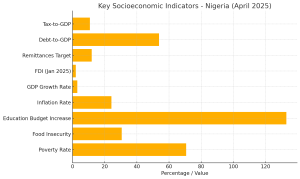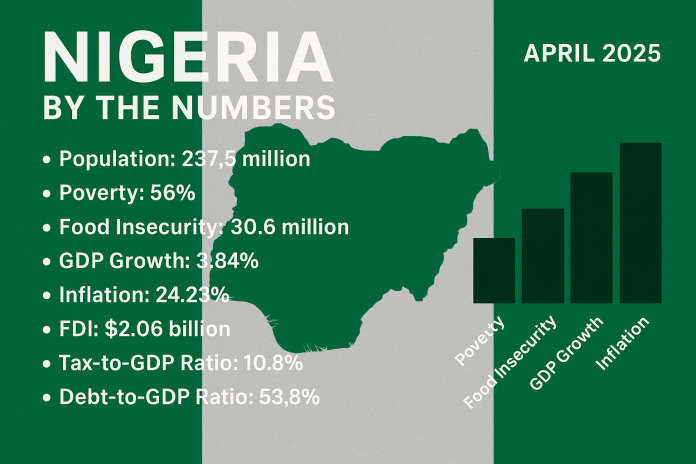By Newspot Nigeria Editorial Board
Society
-
Population: Approximately 237.5 million, making Nigeria the most populous country in Africa and the 6th globally. World Population Review
-
Poverty: An estimated 56% of Nigerians live below the national poverty line, equating to about 129 million people.
-
Food Insecurity: Approximately 30.6 million people across 26 states and the Federal Capital Territory are projected to face acute food and nutrition insecurity at Crisis (CH Phase 3) or worse during the June–August 2025 lean season.
-
Education: The federal government allocated ₦3.5 trillion to education in the 2025 budget, reflecting a commitment to improving the sector.
Economy
-
GDP Growth: Nigeria’s economy grew by 3.84% in Q4 2024, the fastest rate in three years, driven largely by the services sector. Reuters
-
Inflation: As of March 2025, the inflation rate stands at 24.23%, with food inflation remaining a significant concern. Reuters
-
Foreign Direct Investment (FDI): Capital inflows surged to $2.06 billion in January 2025, the highest in two years, indicating renewed investor confidence. Leadership News
-
Remittances: Nigeria is targeting $1 billion in monthly remittance inflows, with initiatives like a proposed diaspora bond to attract funds from Nigerians abroad. Economic Confidential
-
Labor Informality: The informal economy constitutes approximately 57.4% of Nigeria’s GDP, underscoring the significant role of informal employment in the country’s economic landscape. NaijaSpider Blog
Governance & Public Finance
-
Tax-to-GDP Ratio: Nigeria’s tax revenue stands at 10.8% of GDP, one of the lowest globally, prompting ongoing tax reform efforts to enhance revenue collection. Reuters
-
Debt-to-GDP Ratio: As of September 2024, Nigeria’s government debt accounted for 53.8% of its nominal GDP, reflecting fiscal pressures amid economic reforms. Global Economic Data
-
Political Landscape: President Bola Tinubu’s administration continues to implement economic reforms, including subsidy removals and currency adjustments. However, challenges persist, such as the declaration of emergency rule in Rivers State following pipeline vandalism and political tensions. Financial Times

Trade & Investment
-
Major Trading Partners: The United States remains a top destination for Nigeria’s oil and agricultural exports.
-
Top Exports: Petroleum, natural gas, cocoa, sesame, cassava, and fintech services continue to be significant contributors to Nigeria’s export economy.
Infrastructure & Technology
-
Digital Penetration: Internet access exceeds 50%, but a rural-urban digital divide remains.
-
Power Generation: The sector faces challenges, including a failing grid, gas shortages, and vandalism. The government has reduced electricity subsidies by 35% following a targeted tariff hike for high-usage consumers. Reuters
-
Transport: Infrastructure expansion continues through public-private partnerships and international collaborations.
Security & Rule of Law
-
Security Challenges: Banditry in the Northwest, insurgency in the Northeast, and oil theft in the Niger Delta remain pressing issues.
-
Governance Watch: Emergency rule declared in Rivers State raises constitutional questions.
-
Judiciary: Reforms are underway to decongest courts and improve access to justice.
Demographics & Migration
-
Urbanization: 52% of Nigerians live in urban areas.
-
Diaspora: Over 1.7 million Nigerians live abroad, with top destinations including the U.S., U.K., and Canada.
-
Migration Trends: Driven by unemployment, insecurity, and educational aspirations.
Share your story or advertise with us: Whatsapp: +2347068606071 Email: info@newspotng.com







 California Proposes Mandatory Registration and Reporting for Commercial Property Owners
California Proposes Mandatory Registration and Reporting for Commercial Property Owners









